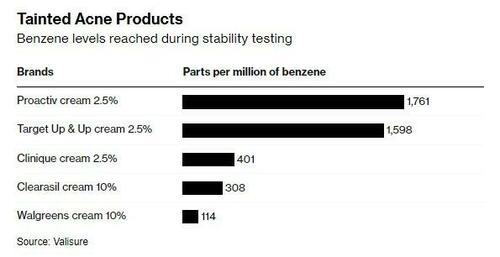This article was originally published by Tyler Durden at ZeroHedge.
Acne treatments are the latest product to be found to contain high levels of benzene – a chemical linked to cancer.
The revelations came via Bloomberg on Wednesday morning, who wrote that popular brands like Proactiv, Target Corp.’s Up & Up, and Clinique all have “elevated levels” of the carcinogen.
The data comes via an independent testing laboratory, which filed a petition with the US Food and Drug Administration asking for the FDA to recall the treatments, all of which contain benzoyl peroxide.
The lab is asking for a recall pending an investigation, according to the article.
Valisure LLC, a testing lab in New Haven, Connecticut, has revealed benzene, a carcinogen found in gasoline and tobacco smoke, in various consumer products over the last three years, prompting recalls from major companies like Johnson & Johnson, Unilever, and Procter & Gamble.
The discovery has raised concerns about the FDA’s regulatory effectiveness. In recent research, Valisure tested 66 benzoyl peroxide acne treatments and found some contained up to 12 times the FDA’s allowed benzene level, especially under conditions mimicking high temperatures.
High benzene levels were notably found in products from brands such as Proactiv, Target, Clinique, and Clearasil. This issue underlines the challenges in ensuring product safety and the importance of independent testing by organizations like Valisure, which serves health systems and the Department of Defense to ensure drug quality.
Valisure President David Light commented: “This has been well known for a long time. All that was needed was for someone to check on it.”
“The benzene we found in sunscreens and other consumer products were impurities that came from contaminated ingredients; however, the benzene in benzoyl peroxide products is coming from the benzoyl peroxide itself,” he added.
Incidentally, Bloomberg also writes that “Light is listed as an inventor on a patent filed last year for a method to prevent benzoyl peroxide from breaking down into benzene in drug products.”
Well, that’s an odd and likely lucrative coincidence…
Read the full article here




